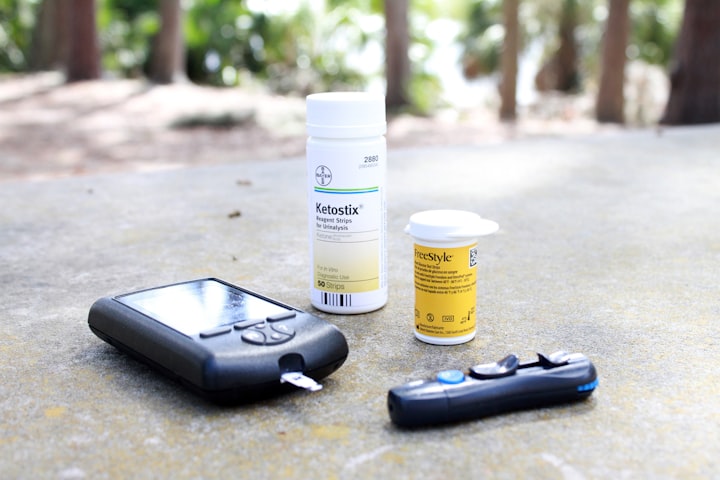How to Monitor Diabetes Effectively and Keep Your Health on Track
Diabetes is a chronic condition that affects millions of people worldwide. It is a condition that requires careful management to prevent complications such as heart disease, blindness, and nerve damage. Monitoring your diabetes is crucial in keeping your health on track. In this article, we will discuss how to monitor diabetes effectively and maintain your health.

What is Diabetes?
Before we delve into how to monitor diabetes effectively, let's first understand what diabetes is. Diabetes is a chronic condition that occurs when the body cannot produce or use insulin effectively. Insulin is a hormone produced by the pancreas that helps regulate blood sugar levels. Without insulin, blood sugar levels can become too high, leading to serious health problems.
There are two main types of diabetes: Type 1 diabetes and Type 2 diabetes. Type 1 diabetes is an autoimmune disorder in which the body's immune system attacks and destroys insulin-producing cells in the pancreas. Type 2 diabetes is a condition in which the body cannot use insulin effectively, leading to high blood sugar levels.
Monitoring Your Diabetes
Monitoring your diabetes is essential in keeping your health on track. Regular monitoring can help you understand how your body responds to different foods, medications, and activities. It can also help you identify patterns in your blood sugar levels, which can help you make more informed decisions about your health.
Here are some ways to monitor your diabetes effectively:
1. Test Your Blood Sugar
Testing your blood sugar regularly is the most important aspect of monitoring your diabetes. Blood sugar testing helps you understand how your body responds to different foods, medications, and activities. It also helps you identify patterns in your blood sugar levels.
To test your blood sugar, you will need a glucose meter, lancet device, and test strips. The lancet device is used to prick your finger, and the test strip is used to collect a small amount of blood. The blood is then placed on the test strip, and the glucose meter reads the amount of sugar in your blood.
2. Keep a Record
Keeping a record of your blood sugar levels is essential in monitoring your diabetes effectively. Record your blood sugar levels, the time of day, and any relevant factors that may have influenced your levels. This record will help you and your healthcare provider make informed decisions about your diabetes management.
3. Understand Your Target Range
Understanding your target blood sugar range is crucial in monitoring your diabetes effectively. Your healthcare provider can help you determine your target range based on your age, overall health, and other factors. Your target range may change over time, so it is essential to work with your healthcare provider to adjust your management plan as needed.
4. Use Technology
There are many technological tools available that can help you monitor your diabetes effectively. Continuous glucose monitors (CGMs) are devices that can be worn on the body and measure blood sugar levels continuously. Some CGMs can even send data to your healthcare provider in real-time, allowing for more proactive management of your diabetes.
Keeping Your Health on Track
Monitoring your diabetes is just one aspect of keeping your health on track. Here are some additional tips to help you maintain your health:
1. Follow a Healthy Eating Plan
Following a healthy eating plan is crucial in managing your diabetes effectively. A healthy eating plan should include a variety of foods, including fruits, vegetables, whole grains, lean protein, and healthy fats. It is also essential to limit your intake of processed foods, sugary beverages, and foods high in saturated and trans fats.
2. Stay Active
Regular physical activity is crucial in managing your diabetes effectively. Exercise can help lower blood sugar levels, improve insulin sensitivity, and reduce the risk of heart disease. Aim for at least 30 minutes of moderate-intensity exercise, such as brisk walking, five days a week. Always consult with your healthcare provider before starting a new exercise program.
3. Take Medications as Prescribed
If you are taking medications for your diabetes, it is essential to take them as prescribed by your healthcare provider. Missing doses or not taking medications as directed can lead to high blood sugar levels and complications.
4. Manage Stress
Stress can have a significant impact on blood sugar levels. It is essential to find healthy ways to manage stress, such as deep breathing, meditation, or talking to a friend or loved one.
5. Get Regular Check-Ups
Regular check-ups with your healthcare provider are crucial in managing your diabetes effectively. Your healthcare provider can monitor your blood sugar levels, adjust your management plan as needed, and screen for complications such as nerve damage, eye disease, and kidney disease.
Conclusion
Monitoring your diabetes is essential in keeping your health on track. Regular blood sugar testing, record-keeping, and understanding your target range are crucial in managing your diabetes effectively. Following a healthy eating plan, staying active, taking medications as prescribed, managing stress, and getting regular check-ups are also essential in maintaining your health.
FAQs
Can diabetes be cured?
No, diabetes cannot be cured, but it can be managed effectively with proper treatment and lifestyle changes.
Can I eat sugar if I have diabetes?
It is important to limit your intake of sugar if you have diabetes, but small amounts of sugar can be included in a healthy eating plan.
Can exercise lower my blood sugar levels?
Yes, regular exercise can help lower blood sugar levels and improve insulin sensitivity.
How often should I test my blood sugar levels?
The frequency of blood sugar testing may vary depending on your individual management plan. Your healthcare provider can help determine how often you should test your blood sugar levels.
What complications can arise from uncontrolled diabetes?
Uncontrolled diabetes can lead to complications such as heart disease, nerve damage, eye disease, kidney disease, and foot problems.
And Finally, if you guys want to access a free tool that was completely developed by me to help you guys, please let me know in the comments section. I will post an article with step by step explanation
About the Creator
Shureshh
With over a decade of experience in the software industry, I am a seasoned professional with a passion for helping others. My expertise in a wide range of technologies allows me to provide tailored solutions for every client's unique needs.






Comments
There are no comments for this story
Be the first to respond and start the conversation.